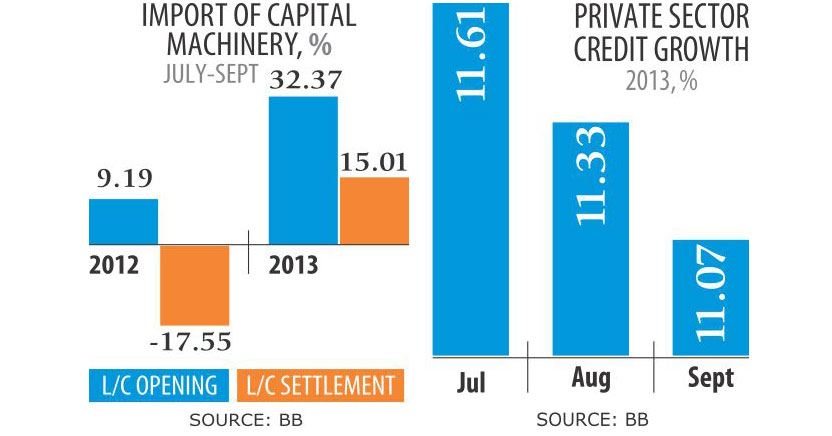Professor Mustafizur Rahman finds mismatches between investment situation and capital machinery imports, published in The Daily Star on Tuesday, 12 November 2013.
Machinery imports rise despite sluggish business climate
Rejaul Karim Byron
Capital machinery imports shot up in the first quarter of the fiscal year, despite the sluggish investment climate induced by political uncertainty—a trend that seems to be an anomaly.
Between July and September, some $566.54 million worth of letters of credit settlement for capital machinery took place, a year-on-year increase of 15.01 percent, according to data from Bangladesh Bank. Letter of credit settlement is the payment made by banks to foreign parties for goods purchased by local businesses.
Curiously, in the first quarter of fiscal 2012-13, when the investment climate was more favourable, total LC settlements for capital machinery stood at $492.61 million, a drop of 17.55 percent from fiscal 2011-12.
LC openings, which signify local businesses’ intention to import in the near future, too shot up during the period, by 32.37 percent from the previous year. LC accounts worth $717.68 million meant for capital machinery imports were opened between July and September.
At the same time, private sector credit growth, a reflection of the financial resources being made available to businesses, has been on a downward trend during the quarter. It stood at 11.61 percent, 11.33 percent and 11.07 percent in July, August and September, respectively.
On the other hand, excess liquidity in the banking sector, which inversely reflects businesses’ willingness to borrow, has been increasing every month for the past one year. In August, it stood at Tk 82,319 crore in contrast to Tk 79,441 crore in June.
“There seems to be an extreme mismatch between the investment situation and capital machinery imports,” Mustafizur Rahman, executive director of Centre for Policy Dialogue, said.
He recommended the central bank and the National Board of Revenue (NBR) investigate if any over-invoicing is taking place, as “money tends to rapidly fly out of the country in the run-up to national election”.
“There is zero tariff on capital machinery imports, so it is easy to carry out capital flight through them,” he added.
Zahid Hussain, lead economist for World Bank’s local arm, said the capital machinery import situation can be interpreted in two ways.
“It could be a sign of optimism among the private sector — that they are expecting the business climate to sharply improve after the election in January. They are gathering all the ingredients now so that they can start production right away.”
“Or, it could be a case of over-invoicing to send money abroad. Only Bangladesh Bank can work out the true picture,” he added.
Mahfuzur Rahman, executive director of BB, however, is of the belief that the spike in capital imports is a sign of things to come. “The political situation will stabilise in six months’ time — the businesses are simply being forward-looking.”
Meanwhile, Nazneen Sultana, deputy governor of BB, told The Daily Star that the central bank has directed the concerned department to inspect whether there is any irregularity involved in the recent capital machinery imports.
The central bank has also taken initiatives to stop the siphoning off of money from the country through over-invoicing and under-invoicing, she said.
An automated monitoring system connecting all the branches of the banks with the central bank has been introduced, due to which all the transactions pertaining to exports and imports can be seen right away by BB. The central bank is also working to connect the NBR with the monitoring system, Sultana added.
However, there is no mechanism in place to detect transfer pricing, a channel through which over-invoicing can still take place. As things work, the shipment charges and the prices at which the goods are purchased are lumped together, meaning the customs officials at Chittagong Port are powerless to detect any wrongdoing.
She said the central bank is working to come up with a robust mechanism against these forms of fraudulence.


